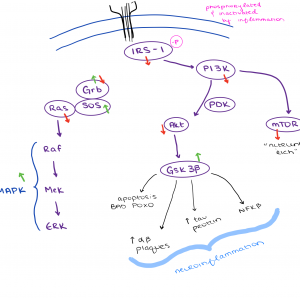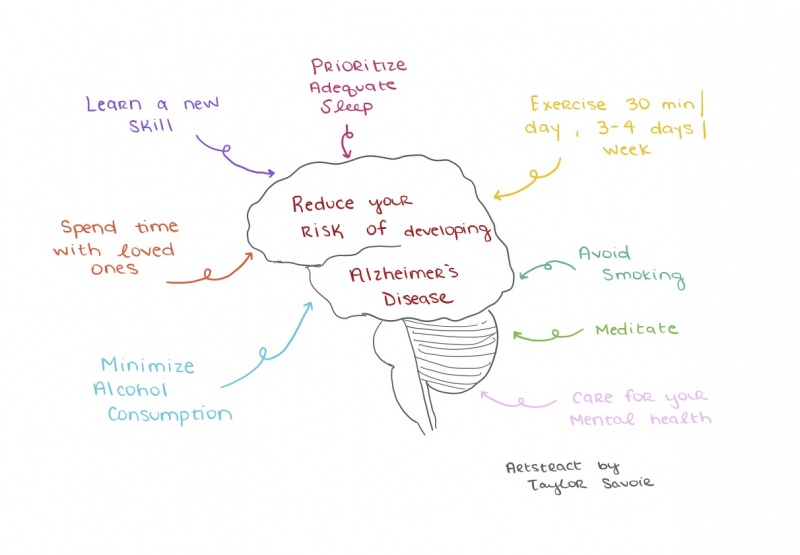Insulin Signaling Pathway’s Relation to Alzheimer’s Disease
Alzheimer’s disease is identified by a buildup of amyloid-β plaque and neurofibrillary tangles (NFTs). Insulin signaling is disrupted in patients with AD leading to the increase of plaque and NFTs. Molecules such as Akt, mTOR, Grb, and RAS have decreased activation in patients with AD. Other molecules are overactivated because of insulin dysfunctions like SOS, MAPK, and GSK-3β. Figure 1 is a simple flow chart I drew of the molecules in the insulin signaling pathway; the green or red arrow next to the molecule signified whether it has increased or decreased activation in patients with AD.

Figure 1: The insulin signaling pathway is dysfunctional in patients with AD.
When these molecules are under or over-activated, insulin abnormalities can lead to insulin resistance. Insulin resistance is linked with the build-up of amyloid-β plaque and NFTs. Patients diagnosed with Type 2 diabetes have increased chances of developing AD because both of these diseases are characterized by insulin signaling abnormalities and insulin deficiency.
Why should we care?
The public should care about Alzheimer’s Disease (AD) because developing it can be greatly impacted by someone’s lifestyle choices. There is no cure for this disease, but increased research of causational factors, early symptoms, and education about it will decrease the number of cases in the future.
Humans have adapted harmful lifestyles that are expected to offset any decreases seen in the AD cases. Especially in the United States, many people smoke, have high body mass indices, and consume large amounts of sugar, fat, and cholesterol. The amount of people with AD has been increasing for decades and is projected to continue growing. Humans live longer than ever before and that is not without its difficulties. The following video from the Alzheimer’s Associated provides a summary of the facts and figures of AD and their projected numbers in the future: https://www.alz.org/alzheimers-dementia/facts-figures/
8 Ways to Decrease Your Risk of Developing AD
There is not one thing in particular that causes Alzheimer’s Disease, but we know about many life choices that can alter your chances of developing it. While living with AD is not on most people’s minds throughout the day, the ways in which we spend our time can help reduce the risks of developing symptoms. The most effective way to prevent Alzheimer’s is to start making the following choices early, consistently, and effectively.
- Learn a New Skill – The brain will form new synaptic connections when exposed to new stimuli. It is beneficial to consistently learn something new in order to decrease your risk of developing AD https://alz.org/aaic/releases_2021/global-prevalence.asp.
- Spend Time with Loved Ones – Strong social interactions are linked to stronger neuron connections and preventing neurodegeneration. Experts are not exactly sure how social stimulation does this, but there is evidence to support the hypothesis.
- Minimize Alcohol Consumption – Excessive use of alcohol can damage brain cells over a period of time. Decreasing the amount of alcohol one drinks can decrease the likelihood of developing AD.
- Prioritize Adequate Sleep – People who get more hours of deep sleep (REM cycle sleep) are less likely to develop AD. Researchers hypothesize that this is because the brain clears out waste during REM sleep that has been linked to AD. https://www.npr.org/sections/health-shots/2020/11/17/935519117/deep-sleep-protects-against-alzheimers-growing-evidence-shows
- Exercise – Experts recommend getting vigorous exercise for 30 minutes a day, 3-4 days a week to experience maximum health benefits. Exercise reduces the risk of cardiovascular disease, diabetes, and neurodegenerative diseases, which can be closely linked to each other. https://www.mayoclinic.org/diseases-conditions/alzheimers-disease/expert-answers/alzheimers-disease/faq-20057881
- Avoid Smoking – Smoking can cause oxidative stress, inflammation, and cancer. It provides no benefits to the human body and only does harm. Avoiding smoking can decrease the risk of developing AD, cardiovascular disease, and brain hemorrhages. https://www.mayoclinic.org/diseases-conditions/alzheimers-disease/expert-answers/alzheimers-disease/faq-20057881
- Meditation – Meditation has been practiced for centuries, but researchers must conduct more experiments to learn about the specific benefits it can provide. People who practice meditation report lower levels of stress than those who do not meditate. High-stress levels are positively correlated with the chances of developing AD; meditation can reduce stress which, therefore, can reduce the chances of AD.
- Care for Your Mental Health – Mental health is strongly linked to physical health. It is important to minimize stress levels, maximize time spent doing things you enjoy, and prioritize caring for yourself. A healthy body needs a healthy mind to take care of it https://alz.org/aaic/releases_2021/global-prevalence.asp.
